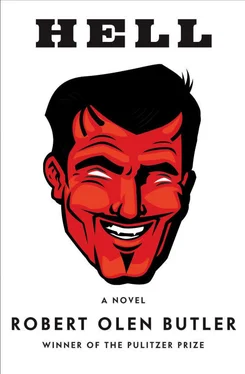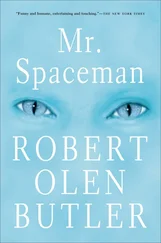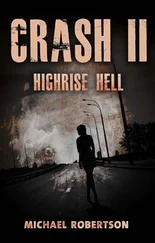“What are you doing here?” she says.
“That’s what I’m trying to figure out,” he says.
“Oh please. You think I’d ever wonder about that ? I mean here.” She flips her chin at the apartment building.
“Trying to figure out what I’m doing in Hell.”
“Read my book.”
“I did. I didn’t believe it.”
“Then I can’t help you.”
This isn’t what Hatcher expected. He expected her to defend the truth of what she wrote. He expected a heated renewal of all that. “You don’t believe it either,” he says.
“Of course I did,” she says.
“Did. But not now.”
“You were a shit.”
“I believe that.”
“ Are a shit.”
“Just not that particular shit,” he says.
“What difference does it make anymore?” she says.
“I don’t know.”
He lifts his hand again toward her.
“Stop,” she says.
He stops.
“Go away now,” she says.
Hatcher turns his face from her. He sees a young black man in an Arrow button-down shirt and Birkenstocks and a Brylcreemed pompadour who is faced off with a young white man in Ben Davis gorilla cuts and a Michael Jordan jersey and dreads. They are pushing each other in the chest.
“Please,” Deborah says.
Hatcher does not intend to ignore her. He just feels utterly inert inside. He can’t bring himself to ask the questions he wants to ask. But he can’t bring himself simply to walk away now either. All he finds he can do is focus on the two young men. Just as he expects the thing between them to escalate, the young black simply grabs one of the white youth’s dreads and tugs it, but not hard, and he shakes his head in outsized disgust.
“Hatcher,” Deborah says, knowing he won’t answer. She closes her eyes and her shoulders droop. He has come to her in Hell simply as a reminder that her insignificance is eternal. Who better.
The young white reaches out and musses up the black’s pompadour and jerks his hand away, exaggeratedly wiping at the grease. The two of them look at each other and start to laugh.
Deborah hears the laughter. Her irritation at Hatcher fades and she turns to the rare sound. They will pay, she knows. The two young men stop and give each other an oh-shit look, and they take a deep breath, and the hair on each of their heads bursts into flames.
Hatcher turns from the two men flailing in pain. Does it have to go that way?
He and Deborah face each other once more.
“Look,” she says, “I don’t know what you want from me. Absolution?”
“No.”
“It wasn’t your fault I was so unhappy. Okay? You helped. But it wasn’t all about you. At first, you were so important — in the world — it made me important too. I was trying to be somebody, and you already were somebody. Then I wasn’t becoming what I hoped to be. You had your work and I admired you so much for it. Until I hated you for it. You know I still try to write? Even here. What’s that about? I have to do it in spray paint on my walls. Maybe you wouldn’t have been able to help me through all that, back when we were alive. But you never thought to try. You were oblivious. You were so… you .”
They sit in silence for a long moment in the middle of the Landing Strip, unaware of the din nearby, aware only of the beating of their own immortal hearts, thumping heavily in their immortal chests, aware of the slip of rancid air into their immortal lungs.
Hatcher thinks: We only hurt each other. “Why are we here?” he says, softly.
“We were always here,” she says.
“Yes,” he says.
“I wish I were dead,” she says.
And just then there is a whoosh of air upon them and a cracking thump and they are spattered with thick wetness. They look. The medieval nun who lives next to Deborah has jumped, and her broken body is beside them and her blood is upon them.
And this puts an end to Hatcher’s time with his second wife. She crawls to the nun, to touch her, speak low to her. He stands up.
“Please,” Deborah says. “No more.”
She says it softly and without looking at him, so he thinks she’s speaking to the old woman. And maybe she is. But then he realizes she’s talking to him as well.
“I’ll just wait a moment for her,” he says. His clothes and face are maculate with her blood, and he does not know how near he has to be for it to find its way back to her. So he stands close by while Deborah strokes the old woman’s head, and Hatcher has the urge to touch his wife again. But he doesn’t. He can’t. She is done with him. All that is done.
But inside her: The Mayor’s office at City Hall and Ed Koch presiding, mugging his way through, and Hatcher says “I do” and I’m fluttering inside and I’m ready, but before Koch turns to me he twinkles at Hatcher like he famously does and he says “How am I doing?” and my friends and Hatcher’s friends all laugh and Hatcher says “Great. How am I doing?” and Koch says “Great!” and everybody laughs again and Koch turns to me and as much as I am happy that I rate the Mayor of New York City as I marry the hot young anchor who beat Rather and Mudd-Brokaw and Reynolds-Robinson-Jennings six weeks running in the Nielsens this spring, I understand with a terrible sudden grinding in my head that nobody has the slightest clue who I am, who I really am, not the Mayor of New York, not these friends laughing, not the media waiting in the street, not the vast public out there reading and listening and watching, not the famous man who is about to become my husband. Nobody. And no matter how much I try, they never will. Deborah squeezes her eyes shut hard, and her mind with it, even as she continues to stroke the head beneath her hand.
Meanwhile, Hatcher has looked away, briefly, to the crowd, grappling on. And then he looks back to the apartment building. Sometimes you can see something but not see it, and then once you do, it is overwhelmingly clear. He looks to the next building down and to the one beyond the crowd. And it is all the same. He turns his face once more to Deborah’s building: The walls are jammed with words, outside on all the surfaces reachable from the ground or from the windows or balconies, and inside too, he recalls now, in the corridors, on every inch of the inner walls and the ceilings and the floors. Everywhere, the housing project is teeming with handwritten words. And like the crowds of Hell themselves, the words are a wild profusion of shapes and forms, bubble letters and rustic capitals, cuneiform and cyrillic, Spencerian and wildstyle. They are spray-painted and brush-painted and knife-bladed and charcoaled everywhere. And what they are not is political or religious, they are not angry or profane. They are names. Just personal names. Just simple assertions of self on the walls of Hell. BLADE and BJÖRK, KILROY and AJIT, TAKI 183 and CELADUS CRESCENS, MAMA DIVINE and DAZE, JULIO 204 and NOVELLIA PRIMIGENIA OF NUCERIA, S. MAGEE and W. M. McCOY, SERGEI and MAHMOUD and CHAN.
Hatcher cannot find the tears he wants to shed. He cries out. Wordless. Just an animal sound, trying to name a thing that has no name. The sound of a Neanderthal, who is filled with a terror and a longing and a grace he cannot understand about his mate or his child. And the blood of the nun is stirring on Hatcher’s face and hands and clothes. And it flies away from him. And he turns and he goes and he rounds the corner of the building and he hurries along and he passes BUFFY and DAFYDD and BUBBA and MENACHEM and LADY PINK and FLY. Hatcher stops, trembling. He looks at the wall. A space. A small space in the crotch of the V in EVA 62. He pounds around on his chest feeling for a pen. He’s wearing his anchorman suit and has one somewhere. There. Fallen into the bottom of an inner coat pocket. He digs out his Bic ballpoint and moves to the wall and he leans into Eva and is deeply grateful for the space inside her. He scratches and inks and scratches until the pen tip is no good for ink but it can still scratch and he puts his name on the wall: HATCHER.
Читать дальше













